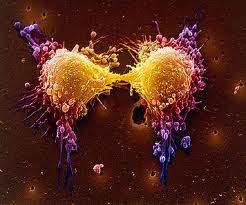SPECIAL CANCER
NK Life AHCC

SIGNIFICANCE AND ETYMOLOGY
The term derives from the greek neoplasia Neos "new", and plásis , " training " and is another way of describing the cancer , a term that derives from the Latin tumor " swelling " .
The event in the form of a malignant tumor is called cancer or carcinoma. The term derives from the greek karkinos (" crab " ) is for the first time it was used by Hippocrates , the father of medicine , who observed that cancer cells form offshoots that cling neighboring normal cells and destroy them , as well as the crab clings the prey with its claws .
Cancer is a disease represented by " an abnormal mass of tissue that grows in excess and in an uncoordinated fashion than normal tissues , and persists in this state after the cessation of the stimuli that led the process," This is the term coined by the oncologist RA Willis, recognized and accepted internationally.
The uncontrolled growth of a group of cells is determined by alterations of their genetic makeup , and is the basis of various diseases, with different characteristics , classified according to three modes:
- According to the histological type of the original proliferating cells : mainly in epithelial tumors , mesenchymal cells , blood cells or nerve tissue
- According to the aggressiveness and the clinical course expected: benign (non- cancerous) and malignant (cancerous or cancer) ;
- According to the tumor staging , or TNM Classification , regarding malignant tumors .
HISTORY
The oldest evidence regarding cancer is dated to around 3000 BC is reported on the oldest form of medicine in our possession , the Edwin Smith Papyrus , which describes breast cancer .
Hippocrates described several types of cancer . Celsus ( 25 BC - 50 AD ) recommended surgery as treatment, while Galen (second century AD) advised the administration of purgatives as a remedy for cancer. These recommendations were valid for 1000 years.
With the use of the microscope , which took place in the eighteenth century , it was discovered that the cancer spreads from the primary tumor through the lymph nodes to other sites , generating the so-called metastasis. This finding is attributed to the English surgeon Campbell De Morgan .
CAUSES
In developed countries, cancer is a leading cause of death. Overall rates of cancer development have increased in recent years ( between 0.5 and 1, 5 % per year ), mainly because of ' general aging of the population and changes in lifestyle . The most significant risk factor for the development of cancer is old age . Most people who are diagnosed with a malignant tumor is over the age of 65.
Among the environmental factors that contribute to mortality : smoking (25-30 %), diet and obesity (30-35 %) , infections (15-20% ), radiation (both ionizing and not, until to 10%), stress, lack of physical activity, and environmental pollutants .
The majority of tumors are non - hereditary. Hereditary cancers are mainly caused by a genetic defect . Less than 0.3 % of the population is a carrier of a genetic mutation that affects the risk of developing cancer .
It is impossible to establish with certainty what has caused a tumor in an individual, as in most cases there are multiple possible causes.
PATHOGENESIS
The pathogenesis of cancers are caused by mutations in DNA that affect cell growth. Substances that cause DNA mutations are known as mutagens , substances that cause tumors are defined carcinogens. Many mutagens are also carcinogens, but some carcinogens are not mutagens. (For example, alcohol is a carcinogen, but it is not a mutagen)
At some point , a cell of the organism " mad ", ie loses some of its properties, it acquires other and begins to multiply outside of each rule. Inside each cell there are " genes controllers " intended to prevent an altered cell can survive . Because the process must be triggered tumor that auditors are out of order. Because of this failure in the mechanism that controls the replication, the cells divide when they should not and generate a huge number of other cells with the same defect adjustment . Healthy cells thus end up to be supplanted by the neoplastic cells.
Both cells of a benign tumor that those of a malignant tumor tend to proliferate in an abnormal but, and this is the fundamental difference, only the cells of a malignant tumor tend to fall off , to invade neighboring tissues , migrate to the organ of belonging to go to colonize other areas of the body . The benign tumor therefore remains limited to the body in which it is developed, while the malignant tumor - in the course of a process that can have a length extremely variable and that still lasts years - extends the disease to other organs, until they hit and compromising vital organs. This process is called metastasis and metastasis represent the most advanced stage of tumor progression , providing the real cause of cancer deaths .
NK Life AHCC
